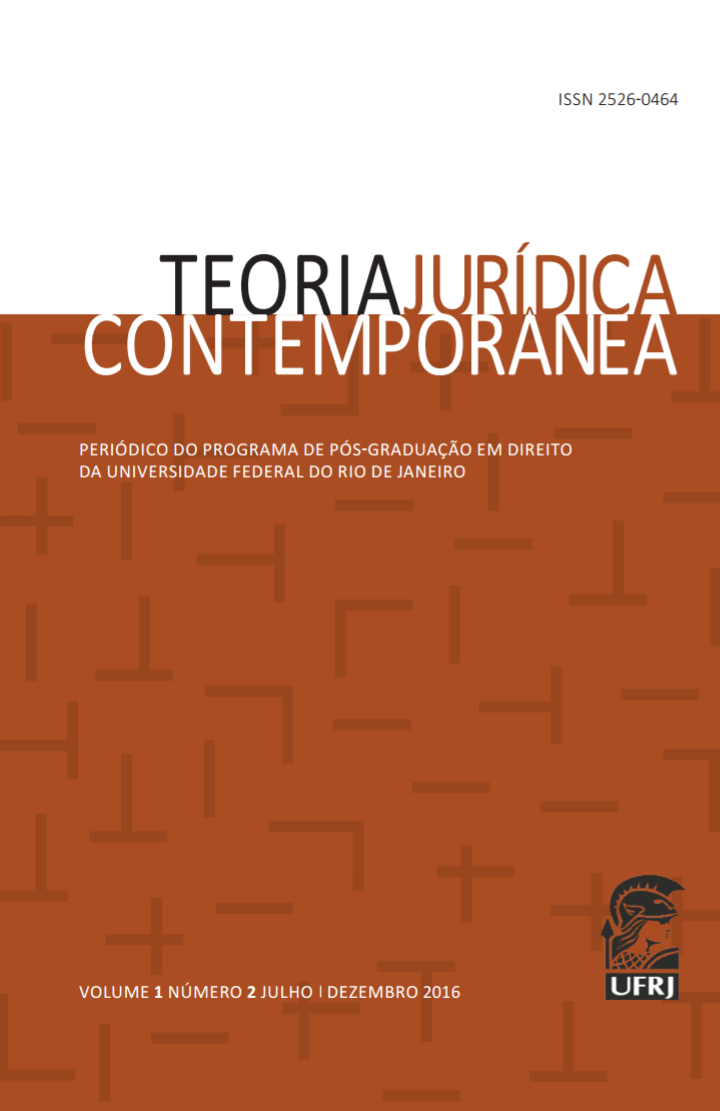Reasoning with persuasive precedent: the role of persuasive authority in the law
DOI:
https://doi.org/10.21875/tjc.v1i2.8653Palavras-chave:
Jurisprudence, Precedents, Persuasive Authority, Non-binding Precedents, Teoria do direito, Argumentação, Precedentes, Autoridade persuasiva, Precedentes não-vinculativosResumo
ABSTRACT:
This paper attempts to draw the attention to the role of persuasive authority in the law, by providing a critical review of Frederick Schauer's influential account of persuasive authorities as optional authorities. Although recognizing that Schauer highlights some important features of the notion, it is argued that, as long as his interpretation leaves no room for theoretical authority in the law, it fails to account properly for one of the main roles of persuasive authorities, namely, to provide future courts with reasons to distinguish their case from previous court's decisions. It is also suggested that persuasive authorities are best understood as theoretical authorities providing practical reasons. The article concludes with some final remarks on the consequences of the adopted view for our understanding of the law in general.
RESUMO:
Este artigo tenta chamar a atenção sobre o papel da autoridade persuasiva na lei, fornecendo uma revisão crítica da influente explicação de Frederick Schauer de autoridades persuasivas como autoridades opcionais. Embora reconhecendo que Schauer destaca algumas características importantes da noção, argumenta-se que, enquanto sua interpretação não deixa espaço para a autoridade teórica na lei, ela não leva em conta adequadamente um dos papéis principais das autoridades persuasivas, a saber, fornecer aos futuros tribunais razões para distinguir o seu caso das decisões dos tribunais anteriores. Sugere-se também que as autoridades persuasivas sejam melhor entendidas como autoridades teóricas fornecendo razões práticas. O artigo conclui com algumas observações finais sobre as conseqüências da visão adotada para nossa compreensão da lei em geral.
Referências
ALLEN, Carleton Kemp. Law in the Making. Oxford: Clarendon Press, 1964.
ATIYAH, P. S. Form and Substance in Legal Reasoning. In MACCORMICK, Neil; BIRKS, Peter (eds.), The Legal Mind. Essays for Tony Honoré. Oxford: Clarendon Press, 1986.
BRONAUGH, Richard. Persuasive Precedent. In: GOLDSTEIN, Laurence (ed.), Precedent in Law, pp. 217-247. Oxford: Clarendon Press, 1987.
CHRISTODOULIDIS, Emilios. The Irrationality of Merciful Legal Judgement: Exclusionary Reasoning and the question of the particular. Law and Philosophy, vol. 18, pp. 215-241, 1999.
DUARTE D'ALMEIDA, Luíz; MICHELON, Cláudio. The Structure of Arguments by Analogy in Law. Argumentation, 2016.
FLANDERS, Chad. Toward a Theory of Persuasive Authority. Oklahoma Law Review, vol. 62, n. 55, pp. 55-88, 2009.
GLENN, H. Patrick. Persuasive Authority. McGill Law Journal, vol. 32, n. 2, pp. 261-298, 1987.
HART, H. L. A. Legal and Moral Obligation. In: MELDEN, Abraham Irving, Essays on Moral Philosophy. Seattle: University of Washington Press, 1958.
HART, H. L. A. Essays on Bentham: Studies on Jurisprudence and Political Theory. Oxford: Clarendon Press, 1982.
HOFFMANN, Leonard. Fairchild in Retrospect. The Advocates Quarterly, vol. 39, n. 3, pp. 257-271, 2012.
HOFFMANN, Leonard. Fairchild and After. In: BURROWS, Andrew; JOHNSTON, David; ZIMMERMANN, Reinhard (eds.), Judge and Jurist: Essays in Memory of Lord Rodger of Earlsferry. Oxford: Oxford University Press, 2013.
HOHFELD, Wesley Newcomb. Fundamental Legal Conceptions. New Haven and London: Yale University Press, 1966.
KAGAN, Shelly. The Limits of Morality. Oxford: Oxford University Press, 1989.
LAMOND, Grant. Do Precedents Create Rules?. Legal Theory, vol 11, n. 1, pp. 1-26, 2005.
LAMOND, Grant. Persuasive Authority in the Law. The Harvard Review of Philosophy, n. XVII, pp. 16-35, 2010.
MARKWICK, Paul. Law and Content-Independent Reasons. Oxford Journal of Legal Studies, vol. 20, n. 4, pp. 579-596, 2000.
MARKWICK, Paul. Independent of Content. Legal Theory, vol. 9, pp. 43-61, 2003.
MARMOR, Andrei. Authorities and Persons. Legal Theory, vol. 1, pp. 345-349, 1995.
MICHELON, Cláudio. Being Apart from Reasons. The Role of Reasons in Public and Private Moral Decision-Making. Springer, 2006.
RAZ, Joseph. The Authority of Law. Oxford: Clarendon Press, 1979.
RAZ, Joseph. Practical Reason and Norms. Princeton, New Jersey: Princeton University Press, 1990.
RAZ, Joseph, The Problem of Authority: Revisiting the Service Conception. Minnesota Law Review, vol. 90, pp. 1003-1044, 2006.
SCHAUER, Frederick. Playing by the Rules. A Philosophical Examination of Rule-Based Decision-Making in Law and in Life. Oxford: Clarendon Press, 1992.
SCHAUER, Frederick. Critical Notice. Canadian Journal of Philosophy, vol. 24, n. 3, pp. 495-509, 1994.
SCHAUER, Frederick. Authority and Authorities. Virginia Law Review, n. 94, pp. 1931-1961, 2008.
SCHAUER, Frederick. Thinking Like a Lawyer. A New Introduction to Legal Reasoning. Cambridge, Massachusetts -- London, England: Harvard University Press, 2009.
SCIARAFFA, Stefan. On Content-Independent Reasons: It's not in the Name. Law and Philosophy, vol. 28, pp. 233-260, 2009.
SIMPSON, A. W. Brian. The ratio decidendi of a case and the doctrine of binding precedent. In: SIMPSON, A. W. Brian (ed.), Oxford essays in jurisprudence, pp. 148--175. Oxford: Oxford University Press, 1973.
Downloads
Publicado
Edição
Seção
Licença
Os autores que publicam nesta revista concordam com os seguintes termos:
- Os autores mantêm os direitos autorais e concedem à revista o direito de primeira publicação, com o trabalho simultaneamente licenciado sob a Licença Creative Commons Attribution que permite o compartilhamento do trabalho com reconhecimento da autoria e publicação inicial nesta revista.
- Os autores têm autorização para assumir contratos adicionais separadamente, para distribuição não-exclusiva da versão do trabalho publicada nesta revista (ex.: publicar em repositório institucional ou como capítulo de livro), com reconhecimento de autoria e publicação inicial nesta revista.
- Os autores têm permissão e são estimulados a publicar e distribuir seu trabalho online (ex.: em repositórios institucionais ou na sua página pessoal) a qualquer ponto antes ou durante o processo editorial, já que isso pode gerar alterações produtivas, bem como aumentar o impacto e a citação do trabalho publicado (Veja O Efeito do Acesso Livre).
Este obra está licenciado com uma Licença Creative Commons Atribuição-CompartilhaIgual 3.0 Brasil.


